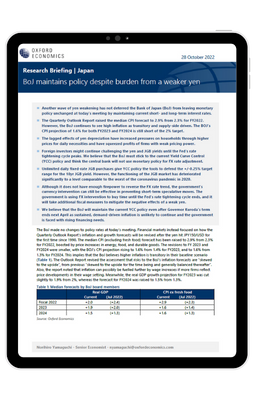BoJ maintains policy despite burden from a weaker yen

The BoJ made no changes to policy rates at today’s (28th Oct) meeting. Financial markets instead focused on how the Quarterly Outlook Report’s inflation and growth forecasts will be revised after the yen hit JPY150/USD for the first time since 1990. The median CPI (excluding fresh food) forecast has been raised to 2.9% from 2.3% for FY2022, boosted by price increases in energy, food, and durable goods. The revisions to FY 2023 and FY2024 were smaller, with the BOJ’s CPI projection rising to 1.6% from 1.4% for FY2023, and to 1.6% from 1.3% for FY2024. This implies that the BoJ believes higher inflation is transitory in their baseline scenario.
What you will learn:
- The lagged effects of yen depreciation have increased pressures on households through higher prices for daily necessities and have squeezed profits of firms with weak pricing power.
- Unlimited daily fixed-rate JGB purchases give YCC policy the tools to defend the +/-0.25% target range for the 10yr JGB yield. However, the functioning of the JGB market has deteriorated significantly to a level comparable to the worst of the coronavirus pandemic in 2020.
- We believe that the BoJ will maintain the current YCC policy even after Governor Kuroda’s term ends next April as sustained, demand-driven inflation is unlikely to continue and the government is faced with rising financing needs.
Tags:
Related Resouces

Post
How Asia’s supply chains are changing | Techonomics Talks
Global supply chains have continued to expand, despite talk of deglobalization and nearshoring. US and Japan have started to de-couple from China, but other G7 countries grow more dependent on Chinese inputs. Several "hotspots" are emerging across Asia with multiple winning formulas.
Find Out More
Post
BoJ to raise its policy rate cautiously to 1% by 2028
We now project that the Bank of Japan will start to raise its policy rate next spring assuming another robust wage settlement at the Spring Negotiation. If inflation remains on a path towards 2%, the BoJ will likely raise rates cautiously to a terminal rate of around 1% in 2028.
Find Out More
Post
Japan inflation to rise to 1.8%, but downside risks are high
Reflecting a surprisingly strong Spring Negotiation result and weaker yen assumption, we have upgraded our baseline wage and inflation forecasts. We now project higher wage settlements will push inflation towards 1.8% by 2027. Uncertainty is high, however.
Find Out More